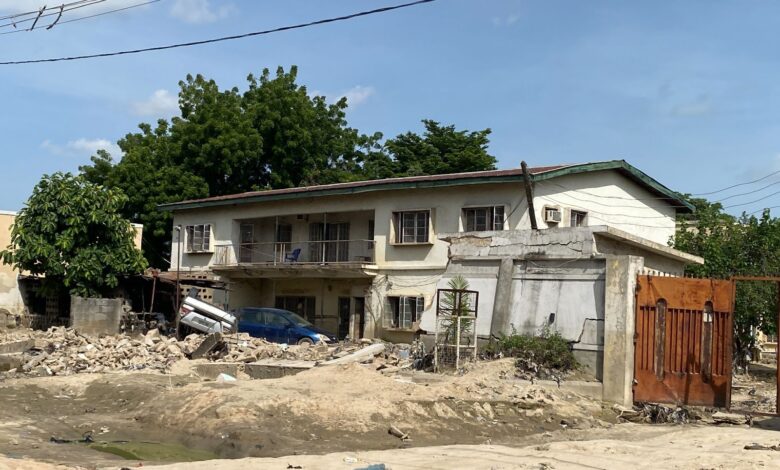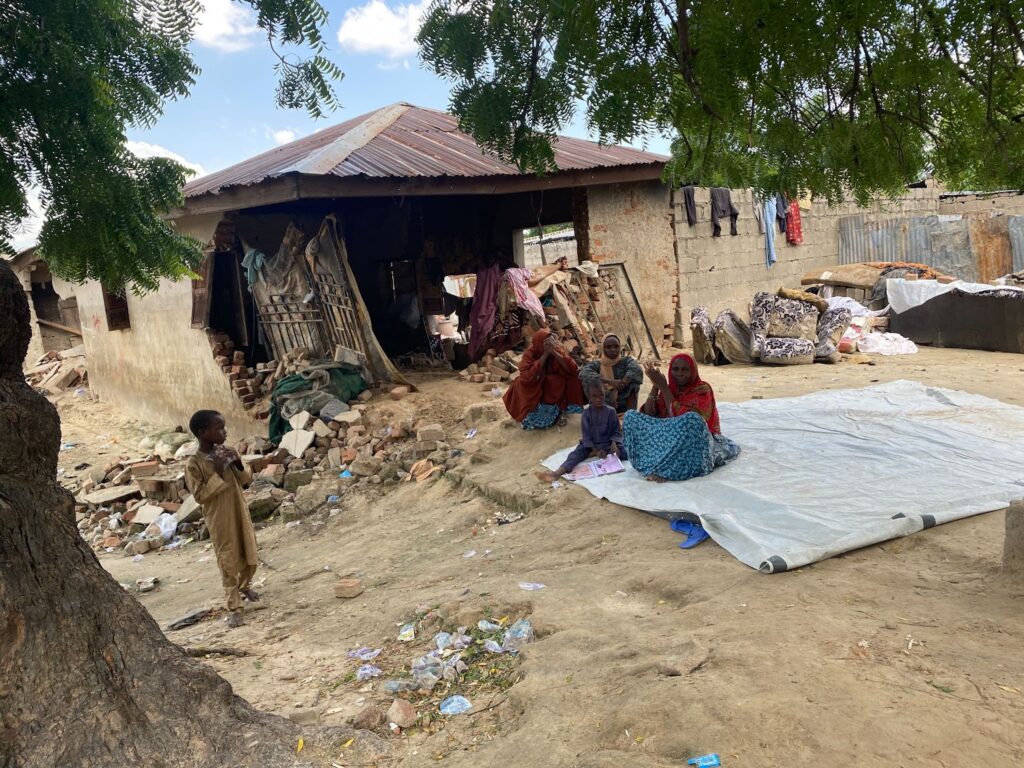From Disaster to Recovery: Borno’s Government Aid Falls Short for Devastated Families
Despite government efforts to provide financial support, many victims are struggling to recover from the devastating floods that occurred in Maiduguri in September 2024.

Following the devastating floodwaters that ravaged Maiduguri, capital of Borno State, northeastern Nigeria, in September 2024, hundreds of families were left to grapple with loss and uncertainty.
The flood which was as a result of the collapsed dam affected over a million people. While no fewer than 37 lives were lost, at least 400,000 others were displaced, according to the state government. It also had a devastating impact on local businesses as many shops, markets, and trading centres were inundated with water, resulting in significant losses for traders and entrepreneurs.
To cushion the effects of the disaster, the State Government, Non-governmental Organisations (NGOs), and other stakeholders provided financial support to affected people.
Alhaji Muhammad, a 50-year-old resident of Limanti Ward in Maiduguri, is one of those who benefitted from the government’s support after the flood destroyed his house, food, clothes, and valuables – notably 25 bags of cement he was storing for a friend. He was forced to flee his flooded home and sought refuge at a relative’s house where conditions were equally difficult.
In a bid to recover quickly, Muhammad diligently followed the necessary procedures to secure government assistance. Eventually, he received ₦101,000 in cash assistance from the government, a gesture he appreciated, but fell woefully short of addressing his extensive needs.
“After buying food and other emergency items for my family, I realised I needed at least ₦550,000 to restore my home to a livable state,” he explained. “Just repairing the broken floor, walls, and toilets took all that money.”
Aside from his residence, Muhammad owns two rental properties that were also damaged by the flood. He spent ₦250,000 to repair one and ₦600,000 on the other.
Despite his struggles, he considers himself fortunate compared to others in his community. “In my area, 90 per cent of those affected by the flood did not receive any support,” he lamented. “Many people’s homes are still destroyed, and they can’t even afford a single block to start rebuilding. Unlike me, they haven’t received any intervention at all.”
He, however, urged the state’s government to expedite its efforts to provide relief. “The government needs to wipe the tears of those who are still crying and make things easier for them, especially those who haven’t received the needed support,” he added.
Another beneficiary, Maimuna Kaka Ali, a 46-year-old mother of five from Kalari, said she received ₦100,000 from the government. While she expressed gratitude for the assistance, it was only enough to make minor repairs to a toilet and part of the floor in her home.
“The walls are still cracked, and I’m afraid they might fall on us at any time,” she said. “However, I am happy that this support has reached me, especially since so many others have yet to receive anything.”
“For most people, having a safe shelter is the most urgent need. When shelter is taken care of, victims can focus on rebuilding their lives and moving forward,” she admonished the government.

‘The Forgotten’
Inna Bukar, a mother of five, shares a story that feels different from many others. Unlike Alhaji and Maimuna, she has yet to receive any form of support.
Recalling the harrowing night when the flood struck, Inna said she was forced to seek shelter with relatives. They stayed there for three weeks, returning periodically to salvage what they could from their home.
However, her husband believed they shouldn’t burden their relatives for too long. He managed to repair one room in their home, allowing the family to return. But the conditions were far from ideal.
“When we came back, the room was so cold that I and all my children fell sick,” Inna said. “We’ve had to manage living in this state ever since.”
Deeply saddened by the lack of assistance, she said while the government conducted a screening exercise in her area, she never had the opportunity to have her details recorded with them.
“When I tried reaching out to them, they said they weren’t responsible for collecting data for people in Gwange near Mansoor Motors,” she explained. “They told me another team would come the next day to consult us, but no one has spoken to me about it since.”
Inna stressed that her home is among those most severely impacted by the flood. She also explained that 20 other victims in her area have been completely overlooked.
“Why have we been forgotten?” she asked. “The government shouldn’t give up on us.”
Authority reacts
When contacted for comments, Ali Bolori, an aide to Borno Governor and member of the flood response committee, explained that the government’s efforts are based on constitutional guidelines.
“The guidelines provided by the government have been used to carry out assessments, with support from community leaders,” said Bolori. “The community leaders have identified those most affected, and data has been collected accordingly.”
He, however, called on residents who have yet to receive support to be patient, saying “the support will reach everyone. We are still waiting on many of the promised donations. This delay is slowing down the process, but I urge everyone to remain patient.”
“We do not want to rush the distribution of aid to the camps, as this could lead to an influx of new camps, which would complicate the process,” he added. “The process is gradual, but everyone will be supported.”
Meanwhile, Ibrahim Umara, who is also a member of the committee responsible for the identification and distribution of relief items corroborated Bolori’s account.
He explained that during the ongoing assessment and distribution process, victims who encounter challenges—such as not being assessed or receiving food aid—should file a written complaint.
He also confirmed that adequate food supplies are available, and if they are exhausted, additional provisions will be procured to meet the needs of all victims. Similarly, he urged victims to be truthful when sharing information, as dishonesty complicates the committee’s efforts and delays relief interventions.
Expert weigh-in
Mustapha Adam Kolo, a disaster expert at the Department of Geography, University of Maiduguri, highlighted the significant impacts of delayed relief efforts on flood victims.
“Delays in relief efforts lead to stress and mental distress, which cannot be overemphasized,” Kolo explained.
He also urged the government to ensure that all affected individuals are adequately cared for during this challenging time.
“The government’s decision to mark riverside properties for demolition is a bold step,” he said. “However, to prevent future occurrences, there’s a need to focus on improving recovery efforts, such as implementing and educating the public on early warning systems. These systems are often ignored but are critical in disaster preparedness.”
“The government should prioritise research and ensure that all policies are based on research outcomes. Effective policy development, especially in terms of development control, is crucial. Also, there needs to be a complete overhaul of the drainage network in Maiduguri. Without this, some sections of the town will continue to experience perennial flooding year after year.”
In September 2024, Maiduguri, Nigeria experienced devastating floods due to a dam collapse, affecting over a million people with 37 deaths and 400,000 displaced. Recovery efforts included financial aid from the state government and NGOs, though many victims, like Alhaji Muhammad and Maimuna Kaka Ali, found the assistance insufficient to cover extensive repair costs.
While some benefitted from aid, others like Inna Bukar received no support and highlighted issues with aid distribution and poor living conditions.
Government representatives emphasized that aid distribution is ongoing and reliant on available resources and community leader assessments. Concerns about delayed relief and the need for effective disaster management measures were raised by disaster expert Mustapha Adam Kolo, who recommended improvements in early warning systems and infrastructure to prevent future flooding.
The government is urged to adopt research-backed policies for effective development control in flood-prone areas.
Support Our Journalism
There are millions of ordinary people affected by conflict in Africa whose stories are missing in the mainstream media. HumAngle is determined to tell those challenging and under-reported stories, hoping that the people impacted by these conflicts will find the safety and security they deserve.
To ensure that we continue to provide public service coverage, we have a small favour to ask you. We want you to be part of our journalistic endeavour by contributing a token to us.
Your donation will further promote a robust, free, and independent media.
Donate HereStay Closer To The Stories That Matter




